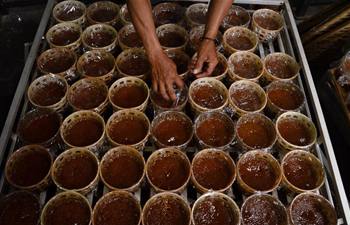TAIYUAN, Feb. 5 (Xinhua) -- More than a decade on from the humiliation of being labeled the world's most polluted city, coal-rich Linfen is waging a war on air pollution and even trying to turn itself into a green city.
Factories that once let out fumes, contaminating rivers and soil, have been forced to close or relocate during the ongoing drive to clear the skies.
The coal industry has been upgraded through the closing of small collieries and merging of larger ones. Coal-replacement programs have been promoted in downtown areas. Official promotions are now tied to environmental protection performance.
It's hard to strike a balance between coal-fuelled economic development and environmental protection, but Linfen is making progress.
BLACK FORTUNE
Located in north China's Shanxi Province, Linfen is a resource-reliant city. The reserves of coal and iron ore reached 39.8 billion tonnes and 420 million tonnes, respectively.
The rich resources have brought serious pollution. At its worst days, heavy smog and industrial dust penetrated every corner of the city -- a scene usually associated with volcanic eruptions.
In the 2000s, foreign media named Linfen as China's coal-rich answer to the Black Country in the industrial revolution. It was also listed as the most polluted city for three consecutive years from 2003 to 2005, among 113 monitored cities in China.
"People felt difficult to breathe on seriously polluted days, the air was full of pungent smells, and the visibility was too low to drive," recalled Du Xiaofeng, a retired official in Linfen.
In its most prosperous days, Linfen's GDP ranked first and industrial added value ranked fourth among 11 cities in Shanxi. As more polluting plants were forced to limit or suspend productions, its industrial added value has fallen to the bottom since last November.
Along with the slowing economic growth, however, is the improving air quality. The density of PM2.5, PM10 and sulfur dioxide has been reduced by 50, 50 and 70 percent, respectively, during the ongoing heating season, compared with the previous year.
By 2030, China aims to cut carbon dioxide emissions per unit of GDP by 60 percent to 65 percent of 2005 levels. To achieve this goal, every city needs to make sacrifices.
Du was once responsible for the city's economic development, but he does not feel pity about the economic losses caused by the environmental protection measures. "Nothing is more important than health," he said.
GREEN TRANSFORMATION
Linfen's dramatic turnaround began in the mid-2000s. According to the city's statistical bureau, it has slashed more than 22 million tonnes of steel and iron capacity and 10 million tonnes of coal capacity since 2003.
Linfen invested more than 82 billion yuan (13 billion U.S. dollars) on pollution treatment last year, dismantling 4,700 coal-fired boilers and creating clean heating systems for 152,000 households.
In 2017, the contribution of the secondary industry to Linfen's GDP declined from over 60 percent in 2008 to 46.2 percent, for the first time lower than the contribution made by the service sector.
"Closing all polluting firms is impossible in a resource-reliant city. Forcing them to reduce emissions through improving discharge standards is more sustainable," Du said.
Every firm must now abide by discharge regulations, with no exceptions. As one of the biggest taxpayers in Linfen, Wanxinda Coking Chemical was ordered to curb its pollution last year, or face a shutdown.
It set up three giant inflatable tents to cover the exposed coal in its yard. "The original fence around the yard was not enough. Black coal dust flew all over the sky in heavy winds," said Si Anran, the company's general manager.
"Sacrificing the environment for economic growth is no longer the case in China. The earlier we change ourselves, the better," said Si.
According to the report delivered at the 19th National Congress of the Communist Party of China last October, China will adopt a holistic approach to preserving its mountains, rivers, forests, farmland, lakes, and grasslands, implementing the strictest possible systems for environmental protection, and developing eco-friendly growth models and ways of life.
The central authorities dispatched inspection teams last year to provincial-level regions, as part of a national campaign to fight pollution and environmental damage. A total of 891 cadres in Linfen have been held accountable for environmental problems.
"Fighting pollution is to seek quality development," said Zhao Baoping, deputy head of the city's environmental protection bureau. "Linfen has no choice but proceed without hesitation to win the war against pollution."

















